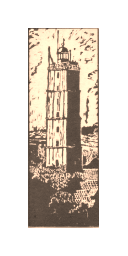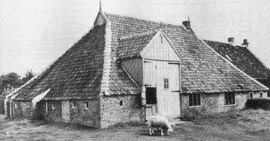
Hinne de Jong
A Chronicle
translated/arranged by his son, Sense de Jong
A spring remembered
- 1: Introduction
- 2: Captain Pieter
- 3: Childhood years
- 4: Shipwreck
- 5: Teenager
- 6: Spring remembered
- 7: That's how it was
- 8: Pre World War I
- 9: Mobilization (1914-1918)
- 10: Boys will be boys
- 11: Hinne leaves Terschelling
- 12: Hinne meets his true love
- 13: An eventful move
- 14: A serious illness
- 15: The war years (1940-1945)
- A1: Memories of Pa (by Truus)
- A2: Memories of Moe (by Truus)
- A3: Pa talks again
- A4: Cornelis Jacob de Jong
Another site by Sense de Jong:
~ Sense de Jong ~
Reminiscences
Sites by Henry de Jong:
~ Herman de Jong ~
Memorial
~ Newmaker Notes~
Writings, Pictures, Collections
~ AACS/ICS Niagara Conferences~
1970 - 1991
It's about the year 1907. Winter is gone and, once again, spring had arrived on Terschelling. A time for lambs to be born.
One day, Opa Cornelis de Jong said to Hinne: "Take some time off and see if you can find our sheep and check if they're okay." Hinne jumped at the chance to get away from schoolwork and farm chores. Soon he was trekking along the "Wadden Zee" dike, checking the vast spaces in the polder.
Although the sheep were allowed to roam freely, Hinne quickly found them. But one was missing. Hinne thought:" Where can it be? Stuck in a ditch? Or...drowned, maybe?"
He recalled a passage from Scripture: "Suppose one of you has a hundred sheep and loses one of them. Does he not leave the ninety-nine in the open country and go after the lost sheep until he finds it? And when he finds it, he joyfully puts it on his shoulder and goes home." (Luke 15-4-5)
Wrote Hinne: "I was indeed filled with joy when, finally, I found the lost sheep. But my joy was diminished because two dead lambs were lying beside the animal. Already their eyes had been picked out by the birds. It hurts when you see something like that and I probably cried a few tears. The ewe had to come with me, but she resisted and wanted to stay with her little ones. I picked up the lambs, one under each arm, and the mother then followed willingly. This was not good news for my parents. But those were the risks of farm life."

No more school
Hinne left school after Grade Six and then had to work on the farm to assist his Dad and his brother Herman. He made many trips with Herman to spread manure on the farm land. And pretty soon, Herman gave Hinne the reins of the horses. Coming back to the “Dellewal,” close to town, they'd meet other farmers and their sons and then, on the beach, the chase was on who'd make it back first. Can you just see them?
Hinne got used to all manner of farm work. The de Jong farm was a dairy/cash crop operation. He learned how and when to sow potatoes, vegetables, oats and barley with the help from his brother Herman. He also learned how and when to harrow and hoe and tackle the weeds. Long, long days, often with sore backs from the many hours of bending over. And, at the end of the day, there were chores to do at home, the cows had to be milked, the animals fed, the stalls cleaned, etc.
Spring time!
Hinne remembered a Dutch rhyme which, translated, goes something like this: "In the month of May all birds lay an egg, except the quail (kwartel) and the gotwit (griet), they do not lay in the month of May." While working the land, Hinne noticed the odd behavior of, for example, a redshank (tureluur) or a plover (kiewiet). He then knew there were eggs to be found, and many were taken home, much to his Mom's delight.
He also searched the dunes for duck eggs (before gathering such eggs were restricted). Hinne couldn't figure out why this was disallowed because hunters were allowed to shoot young ducks when they could barely fly. One could gather plover eggs until April 19. That was fine if the weather was warm. In cold weather not many eggs were found before April 19.
The haying season
Before Terschelling saw the arrival of modern mowing machines, grass had to be mown by hand. Hinne's older brother, Herman, did most of the mowing. Hinne was too young for this heavy work, and his father was not strong enough. However, Opa Cornelis knew how to sharpen the scythes. Hinne proudly wrote that few were as skilled at this art than his Dad.
The mown grass had to be turned and, a few days later, spread out over the fields. Then the whole family arrived to pitch in because the entire field had to be raked to make rolls from the loose grass. Eventually, with a device pulled by the horses, the hay was cocked into the middle of the field. This required some considerable skill. When the grass was sufficiently dry, the hay- loading onto the wagons began.
Hinne came home from school one day and his mother asked him: " Hinne, go to the 'Dellewal' and see if you can see the wagons." And then he saw them come in the distance. He could always tell which wagon was loaded by his Dad: it was the broadest and highest among the others. The wagons were each pulled by three horses and came sometimes all the way from the "Strieper Polder,” close to Kinnum.
Hinne and other boys were often asked to climb up high in the barn and stamp the hay down. They loved to play there. One day, the grandson of headmaster Wichels lost his spectacles. Lo and behold, the following spring Opa Cornelis was feeding hay to the cattle and guess what: there were the tiny spectacles with not a scratch on them. Hinne wrote: "Ah, the spring seasons on Terschelling were always so beautiful. I have never forgotten the blue sky above the green 'polders' and the white dunes."

Harvest time
Following the haying season, the grain had to be harvested. As a boy, Hinne had to bind the sheaves. Then the beets and potatoes had to be dug up. But before that took place, the barley and oats had to be threshed.
The sheaves were then spread out on the threshing floor and the horse would be led around and around over them. Hinne's job was to chase the horse around. Can you just see him stand in the middle of the floor, the rope to the horse and a stick in one hand, and a pail in the other? Why the pail?
Well, when a horse had to poop Hinne was there in a flash to catch the poop in the pail! If the dung landed in the straw, he'd have to pick it up with his bare hands. When the horse stopped to pee, he'd apply the stick and chase the animal off the floor. Peeing had to be done outside. Hinne wrote: "As soon as the horses came outside, the foals would run to their mothers to drink."
The straw had to be shaken and turned and another man guided the horses over everything again. Then the horses would leave, the straw would be removed, and the grain gathered. Then new sheaves would be spread out over the threshing floor and Hinne came back to repeat the whole procedure. Once the horses were back inside, the second man would make bundles of the straw lying outside.
Farm accidents
Wrote Hinne: "After a long day in the field we came home one day at about 4 p.m.. Time to go to the meadows and milk the cows." As Hinne was getting the horse ready, a foal stood next to its mother eager for a drink. But Hinne was impatient and hit the foal to chase it away.
What happened next could have had serious consequences. The foal gave Hinne a sharp kick right in the solar plexus, knocking the wind out of him. Hinne remembered that his brother, Herman, picked him up and pushed him up against the seaweed shed. Another person, "Griet van Aartje," arrived with a full pail of water. Maybe she intended to smack the water into Hinne's face? He just had a drink, however, started to breath again and discovered he was fine. Hinne went back to milking and his stomach never bothered him again.
Once, on a rainy day, Hinne stood on top of the haystack in the barn while his Dad was pulling hay free to feed to the animals. The wooden shoes Hinne wore were very slippery and he lost his balance. From the top of the stack he fell on his stomach onto the threshing floor. Opa Cornelis was quickly at his son's side. Hand in hand they walked past the cows towards the kitchen. Only then did Hinne start breathing again. He commented:" What a joy to be able to breath again. I was glad nothing was broken!."
Want to add something to this chronicle?
Please Feel free to submit your comments!
Everyone is invited to submit comments for posting to our site. Registered
users will additionally receive their own visitor profile page that allows them
to share some basic information as well as provides a summary of their most
recently posted comments.
Register | Login
Subscribe to our comments feed! ![]()